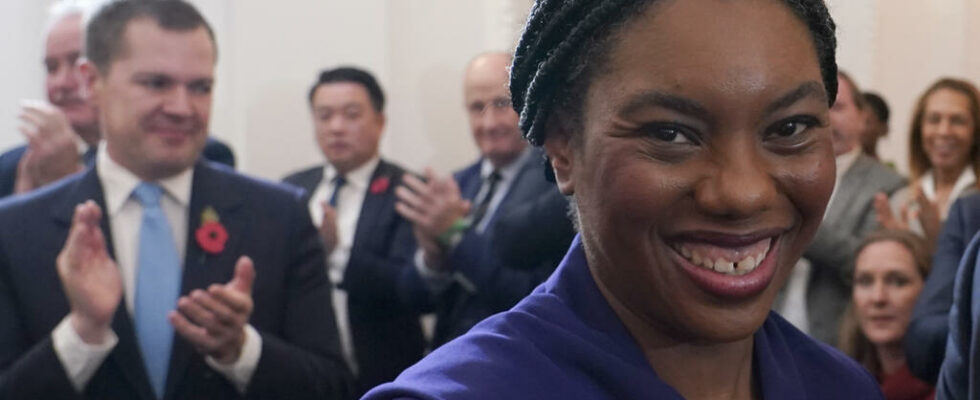It is a shift to the entire right which is confirmed at the head of the British conservatives with the appointment of Kemi Badenoch. Aged 44, raised in Nigeria, she becomes the first woman of African origin to hold such a position in the United Kingdom. His ambition: to revive a very weakened party after the debacle suffered in the last legislative elections.
Designated with nearly 57% of the votes to succeed the former Prime Minister Rishi Sunakshe promises to return to the fundamental values of the British Conservative Party. Member of Parliament since 2017, minister several times since 2019, Kemi Badenoch is one of the figures of a right wing which has taken over within the party.
“ To be heard, we must be honest that we have made mistakes and let our basic principles slip away. ”, she declared after her victory against Robert Jenrick, who had also positioned himself to the right of the party. Before arriving at the head of the Tories, this trained computer scientist had an extraordinary career.
Now 44 years old, mother of three children, she grew up in Nigeria in a rather wealthy family – her father is a doctor, her mother an academic. In the 1990s, his parents decided to send him to the United Kingdom due to the political and economic turmoil shaking Nigeria. And, in the 2000s, she joined the Conservative Party where she met her future husband, Hamish Badenoch, a banker of Scottish origin.
She will quickly climb the ranks within a party which wishes to be more inclusive under the leadership of David Cameron. “ There had been a set of measures and measures to promote ethnic minorities, but also women within the Conservative Partydeciphers Agnès Alexandra-Collier, professor of British civilization at the University of Burgundy. And we saw the appearance of several personalities from ethnic minorities such as Priti Patel or Rishi Sunak, both of Indian ancestry. Kemi Badenoch manages to reconcile these two strategies of a party which aims to be inclusive and which continues its ideological progression towards the right of the political spectrum. »
Outspoken and true conservatism »
Beyond this journey, there is the personality of the new conservative leader, recognized for her charisma and outspokenness, but sometimes criticized for her sweeping statements. “ Kemi Badenoch makes quite provocative remarks, but, unlike other personalities to whom she is sometimes compared, she is also someone who is quite thoughtful in her statements, without the aggressiveness and virulence that we often perceived on the right wing of the political class », however, nuance Agnès Alexandra-Collier.
Basically, Kemi Badenoch proposes a return to what she calls the “ true conservatism »: favorable to Brexitshe wants to reduce illegal immigration, limit the role of the State, and favor businesses. Finally, she says she wants to fight against the “wokism “, that is to say the supposed influence of leftist ideas within society. And she highlights two models: Winston Churchill and above all Margaret Thatcherthe first woman to lead the Conservative Party (she was appointed in 1975) and the United Kingdom (from 1979 to 1989).
“ The reference to Margaret Thatcher is a bit of an obligatory reference for any leader of the Conservative Partypoints out Thibaud Harrois, lecturer in British civilization at Sorbonne Nouvelle University. But it is also a way for her to assume this liberal heritage, to show that she will not seek to compromise with this liberalism, and that she is not at all in the more moderate line of certain conservatives. »
The Tories’ double bet
It is therefore an assumed turn to the right that Kemi Badenoch is proposing with a double objective: to embody a frontal opposition to the new Labor government and to win back the voters seduced by Reform UK, Nigel Farage’s partypositioned to the right of the Tories. A double risky bet for the new Conservative leader, who has set herself the objective of bringing her party back to 10 Downing Street in 2029, during the next legislative elections.
To do this, she will have to put back on its feet a Conservative Party which has just suffered its worst defeat in decades – and which sees itself squeezed on its right by the Reform Party, and on its left by the Liberal Democratic Party, which has returned in force in the House of Commons with 72 MPs. With only 121 seats, the party she is leading will have difficulty existing in the face of a Labor Partywhich benefits from a large majority (402 deputies).
When the Conservative Party gave up power in 1997 to Labor Tony Blairit took him 14 years to regain power. The task promises to be difficult for Kemi Badenoch, who could however benefit from the more than laborious beginnings of the government of Keir Starmeralready faced with numerous controversies since the Labor leader entered 10 Downing Street.
